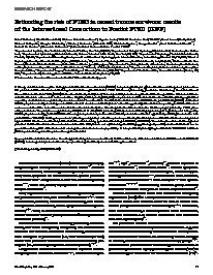Estimating the risk of PTSD in recent trauma survivors : results of the International Consortium to Predict PTSD (ICPP)
A timely determination of the risk of post-traumatic stress disorder (PTSD) is a prerequisite for efficient service delivery and prevention. We provide a risk estimate tool allowing a calculation of individuals’ PTSD likelihood from early predictors.
Members of the International Consortium to Predict PTSD (ICPP) shared individual participants’ item-level data from ten longitudinal studies of civilian trauma survivors admitted to acute care centers in six countries. Eligible participants (N=2,473) completed an initial clinical assessment within 60 days of trauma exposure, and at least one follow-up assessment 4-15 months later. The Clinician-Administered PTSD Scale for DSM-IV (CAPS) evaluated PTSD symptom severity and diagnostic status at each assessment. Participants’ education, prior lifetime trauma exposure, marital status and socio-economic status were assessed and harmonized across studies.
The study’s main outcome was the likelihood of a follow-up PTSD given early predictors. The prevalence of follow-up PTSD was 11.8% (9.2% for male participants and 16.4% for females). A logistic model using early PTSD symptom severity (initial CAPS total score) as a predictor produced remarkably accurate estimates of follow-up PTSD (predicted vs. raw probabilities: r=0.976). Adding respondents’ female gender, lower education, and exposure to prior interpersonal trauma to the model yielded higher PTSD likelihood estimates, with similar model accuracy (predicted vs. raw probabilities: r=0.941).
The current model could be adjusted for other traumatic circumstances and accommodate risk factors not captured by the ICPP (e.g., biological, social). In line with their use in general medicine, risk estimate models can inform clinical choices in psychiatry. It is hoped that quantifying individuals’ PTSD risk will be a first step towards systematic prevention of the disorder.
Geachte bezoeker,
De informatie die u nu opvraagt, kan door psychotraumanet niet aan u worden getoond. Dit kan verschillende redenen hebben,
waarvan (bescherming van het) auteursrecht de meeste voorkomende is. Wanneer het mogelijk is om u door te verwijzen naar de bron
van deze informatie, dan ziet u hier onder een link naar die plek.
Als er geen link staat, kunt u contact opnemen met de bibliotheek,
die u verder op weg kan helpen.
Met vriendelijke groet,
Het psychotraumanet-team.
In: World Psychiatry, ISSN 1723-8617 ; eISSN 2051-5545 | 18 | 1 | February | 77-87
https://doi.org/10.1002/wps.20608


